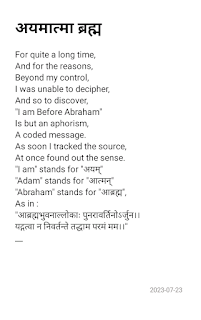Aging!
आयुः आयाति प्रयाति च इति आयुः। What comes and goes away is aging / age. What really comes and goes away? The Time. The Time that is memory, The memory that is recognition, These three words age, memory and recognition could be related to their Sanskrit Equivalents as following : Age is आयुः Memory is स्मृतिः, स्मृतिः is मृतिः, मृतिः is मृतमाणा Recognition is परिसज्ञितिशः / परि सज्ञिति as the words पिधानं and अपिधानं have the same meaning. That is how English words could be found to have something common to the words in Sanskrit having the meaning similar. There is another word "negotiate". In English it means to arrive / reach at an agreement through discussion. Just assuming that this word may be a cognate of a Sanskrit word at first looks difficult but if you know " निगच्छति" and can see how the two words rhyme in pronunciation and resemble in meaning, you could sure feel it interesting at least. You could also discover that learning two languages
